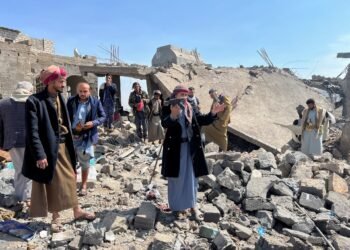Sanaa, Yemen – On the evening of March 15, Ammar Mohammed* strolled through the vibrant streets of a modern residential neighbourhood in northern Sanaa.
The tall, slim man was nattily dressed and expecting a delicious meal at a relative’s home.
The pleasant spring air, cooled after sunset, carried the rich aromas of home-cooked dishes as families prepared to break their fast on the last day of Ramadan.
The two-storey house of his wife’s relatives, the al-Zeinis*, was lit up, as with the other tightly packed homes on that street.
Even from a distance, he could see rows of windows glowing warmly and felt the hum of life radiating from behind closed doors he walked past, as people chatted, children squealed, and cutlery clattered.
He was looking forward to iftar and to his wife joining him later at her relatives’ home for a post-iftar gathering.
The street was bustling – mosque speakers echoed Quranic recitations, children chased each other barefoot over the asphalt, and the clatter of bustling kitchens spilled from open doorways.
He was a stone’s throw away when the evening was split apart.
A deafening roar shattered the calm, a blinding orange flash turning everything into a terrifying artificial dawn.









 United Arab Emirates Dirham Exchange Rate
United Arab Emirates Dirham Exchange Rate

